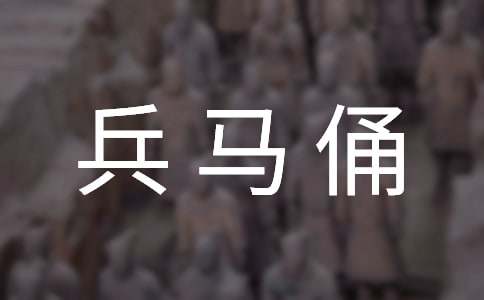- 相關(guān)推薦
陜西-秦始皇陵兵馬俑英文導(dǎo)游辭
Emperor Qin Shihuang's Mausoleum and the Terra-cotta Warriors and Horses Museum

Emperor Qin Shihuang (259-210B.C.) had Ying as his surname and Zheng as his given name. He name to the throne of the Qin at age 13, and took the helm of the state at age of 22. By 221 B.C., he had annexed the six rival principalities of Qi, Chu, Yan, Han, Zhao and Wei, and established the first feudal empire in China's history.
In the year 221 B.C., when he unified the whole country, Ying Zheng styled himself emperor. He named himself Shihuang Di, the first emperor in the hope that his later generations be the second, the third even the one hundredth and thousandth emperors in proper order to carry on the hereditary system. Since then, the supreme feudal rulers of China's dynasties had continued to call themselves Huang Di, the emperor.
After he had annexed the other six states, Emperor Qin Shihuang abolished the enfeoffment system and adopted the prefecture and county system. He standardized legal codes, written language, track, currencies, weights and measures. To protect against harassment by the Hun aristocrats. Emperor Qin Shihuang ordered the Great Wall be built. All these measures played an active role in eliminating the cause of the state of separation and division and strengthening the unification of the whole country as well as promotion the development of economy and culture. They had a great and deep influence upon China's 2,000 year old feudal society.
Emperor Qin Shihuang ordered the books of various schools burned except those of the Qin dynasty's history and culture, divination and medicines in an attempt to push his feudal autocracy in the ideological field. As a result, China's ancient classics had been devastated and destroy. Moreover, he once ordered 460 scholars be buried alive. Those events were later called in history “the burning of books and the burying
【陜西-秦始皇陵兵馬俑英文導(dǎo)游辭】相關(guān)文章:
陜西西安兵馬俑導(dǎo)游詞02-05
秦始皇陵兵馬俑的導(dǎo)游詞6篇02-28
陜西導(dǎo)游詞02-16
陜西導(dǎo)游詞04-23
西安兵馬俑英文導(dǎo)游詞范文05-02
陜西的導(dǎo)游詞06-29
秦始皇陵兵馬俑優(yōu)秀作文06-11
《秦始皇陵兵馬俑》教學(xué)反思04-20






